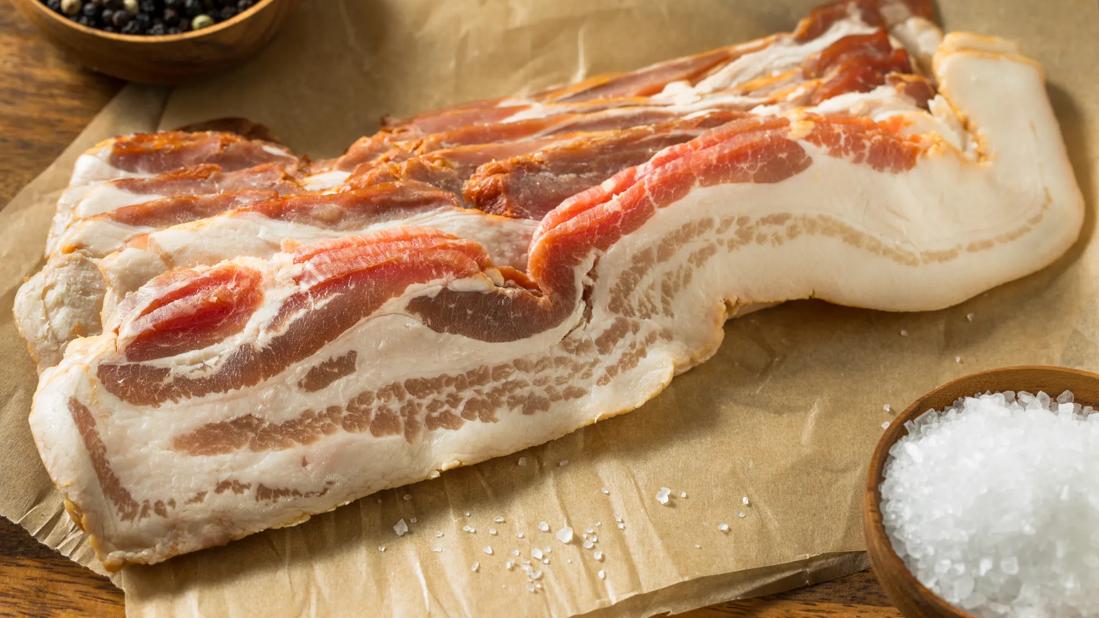While uncured bacon is preserved differently, it’s still processed meat and poses similar risks as cured bacon

Image content: This image is available to view online.
View image online (https://assets.clevelandclinic.org/transform/eac50ca3-d68d-4d58-a53a-6fa54b39c551/uncured-bacon-1224239434)
Uncured strips of bacon on butcher's paper, with salt nearby
If you’re a fan of breakfast meat, there’s a chance that bacon is up there for you as an option. But sadly, these crispy strips of pork get a bad rap because they’re high in cholesterol and salt. On top of that, the fact that bacon is a processed meat is another strike against it in terms of your health.
Advertisement
Cleveland Clinic is a non-profit academic medical center. Advertising on our site helps support our mission. We do not endorse non-Cleveland Clinic products or services. Policy
Like turkey bacon, uncured bacon has sometimes been called the “healthier bacon” because it doesn’t have the added synthetic nitrates or nitrites that cured bacon does. But does “uncured” actually mean better?
Registered dietitian Anthony DiMarino, RD, LD, answers your sizzling questions about cured and uncured bacon, and which one is a better bang for your health.
Before bacon gets to your frying pan, it goes through a bit of a journey. To help preserve flavor, aroma and texture, bacon — like many other meats — is preserved through a curing process. The bacon you see in the grocery aisle goes through an especially intensive curing process to preserve the meat, enhance its flavor and give bacon its signature “bacon-y” texture.
Along with salt, sugar and spices, bacon is cured with sodium nitrates and nitrites. These types of salts help extend the shelf life of meat and control bacteria growth.
Uncured bacon is technically … still cured. But instead of synthetic nitrates or nitrites, uncured bacon is preserved using natural sources of nitrates. This may be celery powder, beet juice or sea salt. Technically, all bacon is cured somehow; “uncured” simply means it’s free of artificial preservatives.
Advertisement
The biggest health concern is that cured bacon uses nitrates and nitrites, which can turn into nitrosamines when mixed with certain amino acids during the food-prepping process. Nitrosamines can increase your risk for different types of cancer.
Uncured bacon is an attempt to make the meat healthier and decrease the development of nitrosamines in bacon. But uncured bacon may not be the truly healthy option you may think it is.
“Uncured bacon is a misnomer. It’s still cured (or preserved) but uses natural nitrates found in celery instead of artificial nitrates,” DiMarino reiterates.
The idea that uncured bacon is healthier largely comes from the fact that not all nitrates and nitrites are unhealthy. Those that are naturally occurring, like the ones in spinach and celery, are even associated with cardiovascular benefits. But a 2020 review found that even when these are used as additives, they can still lead to nitrosamine formation.
A 2022 review also showed that the source of nitrates/nitrites (whether natural or synthetic) may not matter. Both synthetic and plant-based nitrites can lead to the formation of nitrosamines, especially under high cooking temperatures.
While nitrates and nitrites are classified as curing ingredients by organizations like the United States Department of Agriculture (USDA), there are recommended limits on how much you should inject.
In short, there isn’t a type of bacon that avoids all health risks. So, it’s better to maintain a balanced diet and limit bacon (and other processed breakfast meats) to only eating occasionally. And, as DiMarino explains, cooking bacon at high temperatures releases even more harmful nitrosamines, so overcooking can worsen that issue.
“Don’t burn your meat and make sure you’re flipping it often while cooking,” he advises.
Even when adding bacon to your meal, you still should aim for a good balance. Your breakfast plate should never be all bacon — even if it is easy to pick up and munch on. It’s better to opt for two slices rather than five, and keep your plate colorful with fruits and veggies (versus all brown!).
“If you do decide to have a slice, consider serving it alongside a natural dose of vitamin C found in citrus fruits, bell peppers, broccoli and more,” he suggests. This boost of vitamin C can block the formation of those carcinogenic substances.
Choosing uncured over cured bacon isn’t going to make much of an impact on your health. It's best to good to think of bacon as the dessert of meats — a very occasional indulgence, not a regular go-to.
Advertisement

Sign up for our Health Essentials emails for expert guidance on nutrition, fitness, sleep, skin care and more.
Learn more about our editorial process.
Advertisement
Pick bell peppers to help fight cancer, memory decline and joint pain
The tropical fruit is a good source of antioxidants and vitamin C
High amounts of cholesterol and saturated fat in red meat may be linked to heart disease
The leaves and pods from this tree are rich in essential nutrients
This starchy root vegetable is a staple in many global cuisines — but it has to be prepared correctly, or it can cause serious concerns
These delicate green sprouts can give you an extra dose of vitamin K and other nutrients — but they’re not safe for everyone
Edamame, lentils and chicken breast are good sources of protein
Eating this root vegetable can help support your eye, heart and brain health
Prioritize your health by managing stress, strengthening your social connections and getting quality sleep
Bolsters, blankets, pillows and blocks can offer extra support, stability and comfort
Allergies, postnasal drip, asthma or reflux could be to blame for a cough that won’t quit